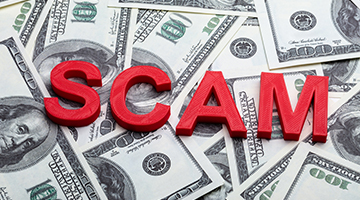Payday Loan Scams: How to Recognize and Avoid Them?

Payday loans became a common solution to small financial emergencies. When an unexpected bill or car repairs occur, Americans consider this type of loan as one of the legit money options. Unlike other financial institutions, payday lenders can provide quick funding with no hard credit checks, which is the most important factor for many individuals.
Alongside the rising popularity of payday loans, there are increasing scams within the industry. For instance, a scammer may collect your personal information and take out a loan you have never borrowed. How do payday loan scams work, and how to recognize and avoid them? Keep reading to get answers to the most crucial questions related to the cash advance loan industry.
Table of Contents
- How Does a Payday Loan Scam Work?
- How to Spot Payday Loan Scams in the USA?
- Signs of Payday Loan Scams
- How to Avoid Payday Loan Scams Online?
- What to Do if You’ve Been Scammed?
- The Bottom Line: How to Avoid Internet Payday Loan Scams
How Does a Payday Loan Scam Work?
Payday loan scams are based on people’s need for fast cash. As a rule, these people lack financial literacy, and they feel the strongest desperation, so they are ready to do anything to get financing.
Scammers steal their personal and bank account information after they apply for an online loan and try to force their victims to pay. Below, you can see the list of the most common types of cash advance scams:
Payday Loan Scams via Phone Calls
In a payday loan call scam, “lenders” call you to collect the debt you have never owed. They usually pretend to be a representative or lawyer of a payday loan company or even a government organization worker.
Scammers usually make threats to bully you into making a payment. They manipulate you by yelling and threatening to sue you or garnish your wage. Their main tactic is pressure.
If you get a call from an unfamiliar debt collector, ask for more information about your “loan”. This step can show a scammer that it will be difficult to scam you.
This step can show a scammer that it will be difficult to deceive you.
If a “lender” sends you a document with the debt you owe, check whether such a financial organization exists and whether it is registered in your state.
A reliable way to ensure you deal with fake debt is to check your credit report, which presents all your outstanding loans.
Phishing Emails
Phishing emails are a common type of payday loan scam that appears to belong to major payday loan companies requesting the recipient’s email and password. These emails often include a direct link to a page that requests personal and financial information. A scammer may then use the name and account information to make online purchases or withdraw money from an ATM machine.
Fake emails similar to this may also request sensitive data during the loan approval process. For example, these emails may ask the recipient to send personal data such as Social Security information, bank account details, and other personal details under the guise of loan approval. Due to the prevalence of this particular scam, it is essential to be cautious and verify the authenticity of any loan-related communication through email. Always remember that if a deal seems too good to be true, it’s probably a scam.
Sky-High Interest Rates
Although payday loan interest rates are known as not the lowest ones, some lenders make them unaffordable, leading individuals to borrow more money. How to understand you are a victim of predatory lenders?
It is super easy to obtain a loan. Scammers try to provide quick loans that are available to almost everyone. They promise instant approvals and deposits and don’t perform credit checks to attract as many clients as possible. A lender makes you extend or refinance the debt. Refinancing and extending the loan always result in higher fees and interest rates, making managing the debt impossible. No credit score improvements. Reputable financial institutions usually report all your loan payments to the three main credit bureaus. So, you can both improve or hurt your credit. Predatory lenders typically skip this step.
Debt Protection Offers
Scammers can pose as government agencies providing financial support or as credit repair providers. To use their services, you will need to pay an advance fee, which is impossible in reliable companies.
Don’t believe anybody who guarantees you an increase in your credit score or getting rid of debts. These are things that can’t be guaranteed.
Check the organization that calls you. Don’t provide your personal information and send money to anybody without checking who they are. Even if they call or text you offering special rates on payday loans or debt reduction, you should know that these are the first signals of scams.
Requesting Advance Fees
Advance fee loan scams involve a company (or individual) promising to give you the required loan amount and asking for a fee paid in advance. They usually advertise online, in classified ads, or flyers. They do not ask for the fees to be paid via a credit card, as the transaction could be traced. Instead, they ask for payment through “alternative” methods such as wire transfer or courier.
Identity Theft Scams
Identity theft, which involves potentially borrowing payday loans in your name, is a common scam in the payday loan industry. Identity thieves steal your personal information and borrow money in your name. In the case of payday loans, such thefts are especially frequent, as lenders don’t check your credit report and require only basic information before giving you funds.

How to Spot Payday Loan Scams in the USA?
To detect a payday loan scam in the USA, pay attention to the following things:
Upfront payments. If a lender requires an advance deposit, fee, or insurance, it’s often a sign you are dealing with a scammer. No identity and credit checks. Reputable lenders always want to know who they are working with. They ask for your basic personal information and perform at least a soft credit check to ensure you can repay the loan. Aggressive communication tactics. Be careful if you feel pressure and aggressivity from an institution, as these are common scammers’ tactics. Check the legitimacy. Always check to confirm a provider’s location and registration status. This simple step can help you instantly spot scam payday loan companies. Poor spelling and grammar. The way lenders communicate can say a lot about them. Legitimate companies always hire workers who at least do not have problems with spelling and grammar.
“Payday lending usually means lower requirements for borrowers and faster funding than other types of loans. However, it is not perfect and it is not worth calling your clients and recommending them to borrow money. Don’t trust anyone who tries to ensure you that you need to apply for a loan when you don’t really need it.”
– Shania Brenson, co-founder and financial expert at 15M Finance.
Signs of Payday Loan Scams
The warning signs of payday lenders include:
The lender uses non-traceable payment methods
If you’re asked to pay using an odd payment method, it’s likely a sign of a scam. Prepaid cards, gift cards, or services like Western Union, PayPal, Venmo, or Zelle are often chosen payment methods by scammers, as they are difficult to trace.
Legitimate lenders would accept a check, debit card, or bank transfer. Banks usually do not ask you to deposit a check and then send part of the money back to “confirm your identity.” If that happens, you’re probably getting played.
The lender refuses to provide information about the company
You should be cautious if a corporation hesitates to expose its details, such as its physical address and business license number. Reputable businesses don’t mind offering these kinds of details. If a company refuses your request for the data, it might be misleading. If this occurs, you should proceed with care, as this indicates that the company may be a scam.
The lender reaches out to you unsolicited
If anyone contacts you out of the blue, whether it’s by phone, text, or email, take care – it could be a scam. As phone numbers and email addresses can be easily falsified, a scam could look like it’s coming from a company you know and trust. Watch out for other clues about the caller’s identity, and verify any contact details directly with the business.
How to Avoid Payday Loan Scams Online?
Even if you need an urgent cash advance loan, take the following steps to eliminate the risk of dealing with scammers.
Shop around to find reputable lenders
Always research the lender to ensure they are reliable and reputable. Find a lender whose street address and phone number are well-known in your area, and look for customer reviews about the provider.
Pay attention to the website
Always enter a web address for a lender into your browser by hand and watch for the padlock icons in the window frame of your browser. This tells you that the website you visited is secure.
Believe yourself
If something seems too good to be true, it probably is. If the lender tells you they need to get an upfront fee to provide you with a loan, it’s most likely a scam. There are plenty of reputable online lenders. It’s best to look elsewhere for money if you’re not entirely sure they’re legitimate and reliable.
What to Do if You’ve Been Scammed?
If a payday loan scam has victimized you, here are the essential next steps:
File a Report with Local Authorities
You can file a detailed report with your local police, but you can also contact consumer protection agencies such as the Federal Trade Commission (FTC) or your state’s attorney general or file a complaint with the Consumer Financial Protection Bureau (CFPB). Be sure to include any communication records and, where possible, documents reflecting the fraudulent transactions.
Contact Your Financial Institution
If you suspect you’ve been victimized, contact your bank or credit union and explain what happened. You’ll want to take prompt steps to mitigate any damage or further financial destruction. They can help stop fraudulent activity or advise you on how to close a compromised account. Ask them to notify your accounts that no new credit should be approved without your explicit consent.
Consider Working With a Credit Counselor
Working with a professional credit counselor may allow you to develop a plan to repair the financial damage. They can evaluate your entire financial situation and develop programs to help you manage your money going forward, preserve your credit, and help you get out from under the grip of payday lenders. They may help you with advice or strategies to dispute any transactions you cannot prevent, all to help you avoid similar situations in the future.
The Bottom Line: How to Avoid Internet Payday Loan Scams
Online lending, especially payday loans, always comes with significant risks, including the possibility of fraud and identity theft. Choosing legitimate lenders and actively monitoring your credit and financial accounts is vital. However, constant vigilance is not always feasible, and thousands of individuals become victims of cash advance scams annually.
